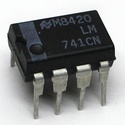DC Bias Op-Amp Single Ended Non-Inverting
0
Favorite
0
Copy
460
Views
Circuit Description

Circuit Graph
OVERVIEW:
Op-Amps can be used as a single supply or a dual supply.
Single supply means that it operates with one power supply.
Dual supply means that it operates with two power supplies, or a center tapped transformer.
We don't always have access to two power supplies or a transformer.
Therefore, a single supply will reduce complexity.
The question is, can we achieve the same outcomes of a dual supply when using a single supply?
PROBLEM:
As you may already know, audio signals swing above and below ground. If you want to
use a single ended Op-Amp, the negative signals below ground will be clipped off.
SOLUTION:
There is a trick around this, add a DC component "DC Offset" to the present AC signal.
So, you bring up the AC signal, do what you need to do, and then put it back where it was.
EXAMPLE:
In this example, we have an audio signal of 100mV that we would like to amplify.
The green probe shows the original small audio signal.
The light blue probe shows that we brought up the signal to 12V, half the power supply.
The dark blue probe shows that we added gain to the signal.
The purple probe shows that we brought the signal back to where it was,
but now it's amplified.
PROCESS:
1. Add a voltage divider. Use resistors of same value so we get half the supply voltage. This will cause the signal to ride
in the middle of the power supply.
Don't pick values that are too high, this will create noise. Don't pick values that are too small, this will drain the battery
quickly. 100k is a good place to start.
2. Add a coupling capacitor at the input "Cin" to block DC and allow AC to get through.
3. Place a capacitor "Cimportant" after the feedback network. This will create a high pass filter to block the amplification
of the DC signal. This way only the AC signal gets amplified.
4. Finally, add another high pass filter at the output to get rid of the offset and bring the signal back to where it was.
ANOTHER PROBLEM:
If the power supply is noisy, it will affect our design.
We will look into this in a different example.
A solution would be to add an injection resistor and a big bypass capacitor to the voltage divider network.
Creator
TEHRANGELES⚡
132 Circuits
Date Created
1 year, 10 months ago
Last Modified
1 year, 7 months ago
Tags
Circuit Copied From
Open Circuit
✕Circuit Graph
✕







There are currently no comments